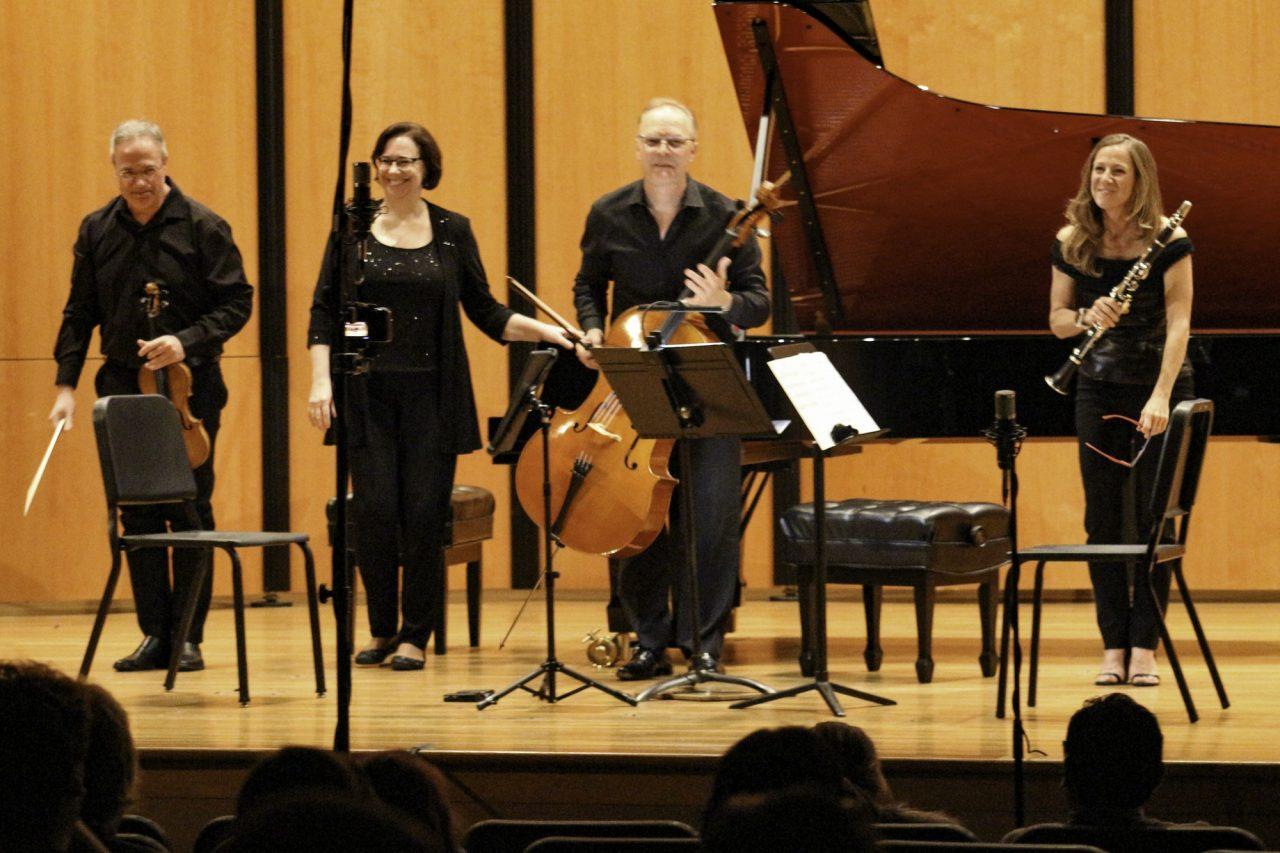photo by Martina Almeida
For the past 25 years, the chamber ensemble SOLI has sought to share music by 20th- and 21st-century composers with not only those in San Antonio but with audiences from across the country. This Tuesday, Feb. 11, SOLI came to Trinity to perform in the Ruth Taylor Recital Hall the second program of their 2019-2020 season, entitled “Winds of Change.”
SOLI is a small, San Antonio-based, ensemble of world-class musicians, featuring clarinetist Stephanie Key, cellist David Mollenauer, violinist Ertan Torgul, and pianist Carolyn True. True is also a professor of music at Trinity. Having attended prestigious schools — New England Conservatory, Julliard, Indiana University and Eastman — these musicians were brought together through their love of chamber music as well as more modern styles.
“I had particularly fallen in love with music by living composers, or contemporary music, in school and just kind of decided that I wanted to start my own ensemble. Why not?” Key asked. “It seemed like a cool thing to do.”
One of the things that set SOLI apart from the many other chamber groups is its unique instrumentation.
“The cool thing about our group is that unlike a string quartet, or an orchestra, or a chorus, we can break down into all sorts of ensembles,” Key said. “In this particular concert, we have two pieces that are the whole quartet, one piece that is for solo violin, one for cello and piano and one that’s clarinet and cello.”
Due to their instrumentation and love for contemporary music, SOLI has commissioned over 100 pieces since its establishment in 1994, more than doubling the repertoire for this specific ensemble. This highlights one of the missions of the group: recognizing today’s composers.
“We’ve commissioned over 100 pieces, and commissioning means not just asking someone to write you a piece but actually paying them. It’s about appreciating young and emerging composers and established composers of all types, and not all American either,” Key said.
The concert featured composers from around the world, including Syria, Belize and China. The theme tying together this specific concert was stories and being able to give these composers the opportunity to share their specific stories and experiences with others through music.
“Sometimes people look at a program and think ‘I don’t know any of these people, so I’m not going to go’, but that’s not it. Each of these composers has a story to tell,” Key said.
SOLI’s performance took listeners on an emotional journey whether they had been through the composer’s specific experience or not. “Memory,” by Chinese-American composer Chen Yi, expresses her feelings of loss over her late teacher and mentor and as some SOLI members recently lost their own teachers, the ensemble anticipated that the piece would be particularly emotional.
“It’s very cathartic to have someone take you there sometimes,” Key said.
Another piece by Errollyn Wallen, entitled “Dervish,” seeks to mimic the atmosphere of the ancient Sufi dance of the same name purely through music.
“The music is very haunting,” Mollenauer said. “The first part is very reflective and repetitive, serious, and then it gets into this really fast and loud section. Then it goes back to this very peaceful, reflective thing, and it ends like it’s just kind of evaporating.”
SOLI earned a standing ovation at the end of their final piece entitled “Ballads of the Borderlands Suite” by Ethan Wickman, who attended the concert. Based on the audience’s applause, it seemed that the ensemble’s concert of emotional stories proved to be a success. Besides their concert at Trinity on Tuesday, SOLI also performed at Jazz Texas at Pearl Brewery on Monday, Feb. 10.
The ensemble said that performance was much more relaxed and informal, something that the ensemble was looking forward to.
“It’s so much more a relaxed atmosphere, and I think that’s really important, especially for new music to take it out of that segregation of the people of stage versus the people in the dark,” Torgul said. “I think an important thing that happens is that new music becomes less scary.”
According to the ensemble, many people are skeptical about contemporary music, believing that it lacks the emotional connection of traditional classical music.
However, SOLI hopes to show people through concerts like this that it doesn’t matter if the music was written in the 18th century or the 21st – all music has a story.
“Really what it comes down to is that, yes, we do really concentrate on music that was written yesterday, basically, but what is not different from a concert that has Haydn or Beethoven is that the human condition still exists,” Key said.
Following their concerts this week, SOLI will close their season with performances in May entitled “Electrified Air.” More information about SOLI at solichamberensemble.com.







